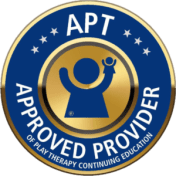CCD 1: Treatment Planning and Case Conceptualization in Child-Centered Play Therapy – May 2, 2025
This training is essential for those practicing Child-Centered Play Therapy (CCPT) to learn a framework and application for treatment planning that utilize symptom-focused goals, often externally required, while honoring the theoretical foundations of CCPT.
This training will:
- Allow you to make meaningful treatment plans and clinical documentation that are aligned with CCPT theory, and
- Allow you to have a clear case conceptualization for how change will occur in CCPT
- Provide you with a workbook of graphics and resources that will enhance your case conceptualization and treatment planning efforts.
Presenter: Rosie Newman, LMHC, RPT-S
Location: Zoom
Date/Time: Friday, May 2, 2025 @ 3:30pm – 7:00pm PST (Convert Time Zone)
CE Hours: 3 APT-Approved Non-Contact CE hours*
ADD-ON OPTION:
Treatment Plan Consult Session is available as an add-on for the training participants.
- Thursday, May 8, 2025 @ 3:30pm-4:30pm PST
CLICK HERE to add a consult session
See Additional Details below for more information about the bundle discount.
Note: Registrants will receive an email with the training details and Zoom link two days prior to the training date.
Description
Treatment planning is antithetical to the person-centered philosophy, which discourages focusing on the problem. This can lead to a disconnect between what is required in most clinical settings, namely, long-term goals and short-term objectives, and the therapist’s way of being in the playroom. However, not only is treatment planning a requirement for managed care and many funding sources, but creating symptom-focused goals and objectives increases caregiver buy-in and enables therapists to explain the treatment plan in an “understandable manner” as emphasized in the Association for Play Therapy (2022) Best Practices. This training teaches participants to conceptualize treatment planning in a way that supports this need for measurable objectives based on managed care, while making space for clinicians to continue to focus on their own theory of change based on the person-centered philosophy.
Learning Objectives:
- Identify the key reasons for treatment planning for play therapists
- Describe the primary theory of personality and theory of change behind Child-Centered Play Therapy
- Demonstrate an understanding of case conceptualization in play therapy including measurable objectives and the theory of change
- Apply principles to create treatment plans that are quantifiable, allow for the way of being in the playroom, and emphasize CCPT theory
Additional Details:
- This training is Section 1 of 4 from the Child-Centered Documentation Framework training series.
- We highly recommend completing the entire series to maximize the benefit of CCD. Use code bundle4 to save $60 when you sign up for all 4 sections.
- However, each section of the series is designed to be stand-alone. If you are unable to complete the series at this time, either [Section 1] Treatment Planning and Case Conceptualization in CCPT or [Section 2] Assessing Progress in CCPT is a good place to start.
- Treatment Plan Consult Sessions with Rosie are available for the training participants. Please sign up here.
- This training includes a practical toolkit of treatment planning resources based on CCPT theory.
- This training assumes a basic understanding of CCPT theory and practice.
- Participants may be invited to engage with peers in breakout rooms to apply the principles to enhance learning.
*These CE hours are applicable for the Registered Play Therapist (RPT) credential and other mental health credentials in WA as approved by an industry-recognized local, state, national, international organization or institution of higher learning” [WAC 246-809-610(3)(a)]. For other states, please consult your state-specific CE requirements. You must be present with camera on the entire session and pass post-tests in order to receive continuing education credits.

APT Approved Provider 18-545

